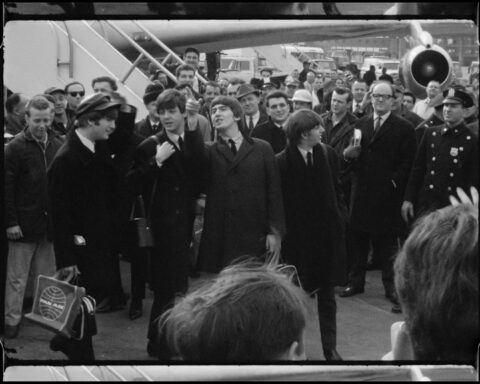The Internet of Everything
(Canada, 52 min.)
Dir. Brett Gaylor
Things are getting smarter. Tech companies are getting sneakier. The internet is everywhere and it’s embedded in more tools that people use daily. Smart technology offers opportunities to plug in, connect, and enjoy data-driven efforts that optimise one’s routines to make life more convenient. However, some terms and conditions may apply.
Brett Gaylor rides the waves of the web in The Internet of Everything. The doc dives into the world of smart technology. Gaylor investigates the pros and cons of letting plugged-in and data-driven devices into one’s home—or, in some cases, body.
The director uses himself as the doc’s central inquisitor. Having made numerous docs about the interwebz including Rip! A Remix Manifesto and the interactive work Do Not Track, Gaylor is the right person to lead this quest. His work has evolved in step with technology, and this doc is a natural extension as the internet leaps beyond computers and phones into gadgets. As a dad, he also tries to keep pace with the technology that evolves as quickly as his kids grow-up. Taking a tech-savvy, but somewhat skeptical (or at least pragmatic) approach, Gaylor looks at the thingies and doodads connected to Bluetooth, Alexa, and whatever newfound spyware Google uses. The results are somewhat surprising, as is pervasiveness of the technology.
A few visits to trade shows introduce audiences to the bevvy of smart technology products that comprise the Internet of Things. Toilets let a user select a playlist or dim the lights while they poop. Newfangled garbage cans erase the chore of stepping on a lever. Smart kitchens let users turn on the water without touching the tap. (A handy gizmo these days!) These things all cater to fans of the sublime, or at least people with far too much disposable income, but the talking heads of the doc articulate how people will pay any price to add some more convenience to their lives. This latest industrial revolution sees a major cultural shift through smart technology in ways similar to the introduction of carbon fuel and combustible engines.
However, just as cars facilitated transportation while spewing countless greenhouse gases into the atmosphere, the price of smart technology too often includes the hidden fee of information. Gaylor hops around the globe to offer case studies in which gadgets supposedly improve people’s lives for the betterment of a few tech companies. The doc introduces an innovator named Kristina as she launches a product called the kegg. The device, which looks far too NSFW for the CBC, goes inside women’s vaginas and harvests data about their fertility levels, which informs women of their ideal windows for getting pregnant. It provides the peak period for fertility and eliminates the risk of redundant sex or a child conceived in the throes of passion. The kegg proves a hit and invites a larger discussion of the ways in which women continue to innovate in a field traditionally dominated by men.
In Hangzhou, China, Tasha Zhou takes Gaylor on a tour of a “smart city.” Using her phone, Zhou pays for public transit, for which she earns points as a “good citizen.” These points can be redeemed for free junk, which incentivizes citizens to be socially conscious. However, the system also has demerit points. The intricate web of things makes each segment of the city a hot spot for surveillance. Big Brother knows when someone jaywalks or does something they shouldn’t. As with the data that Kristina’s device draws from women’s bodies, these smart technologies feed into a larger marketplace of information.
The more revealing elements of the doc unpack the downsides to smart technology. Shopping online, for example, creates a user profile that can be sold to health insurance companies. They might deny a claim based on algorithmic interpretations of one’s shopping habits. (For example, buying too many salty snacks or a bong from Amazon.) The underlying argument of the doc is that people are ultimately the products being sold through smart technology.
The consequences are deep, but the film also looks at communities that try to harness data mining for social good. Vancouver, for example, uses data for predictive policing. It’s not a Minority Report style of justice that jails people for future crimes, although the system similarly uses collected data to predict key sites and times for deviant behaviour. Gaylor interviews a bureaucrat who insists the system reduces home invasions and is therefore successful, yet he also acknowledges that it invites discriminatory practices that might negate its worth.
The doc is full of characters who believe a gadget will improve their lives simply because Big Tech says so. However, Gaylor doesn’t drink the Kool-Aid and finds some stories with serious implications just as he does in the ones mentioned above. One woman offers a terrifying account in which her abuser harnessed smart technology to harass her while he was out of the country. Similarly, a spotlight on Alphabet Inc.’s Sidewalk Labs in Toronto observes the ways in which citizens fight back against smart technology that threatens to privatize public spaces and services.
The Internet of Everything covers a lot of material in its brisk running time. Fuelled by a techno-poppy score and featuring a slickly cut assemblage of talking heads and animated cutaways, the doc speaks the lingo of the hyper-connected world it explores. (Admittedly, there are moments of sensory overload with the volume of information and the sheer noise and pace of the production.) One suspects there’s a fuller feature film to explore this terrain in greater depth/scope, but the doc nevertheless presents many examples that invite viewers to consider the necessity of smart technology in their lives. It’s a worthy cautionary tale for audiences to look at what they’re willing to give up for a few conveniences, or the freedoms they can perhaps retain by doing things the old-fashioned way.
The Internet of Everything is available on CBC Gem and airs on CBC Docs POV March 22 at 9:00 pm.













